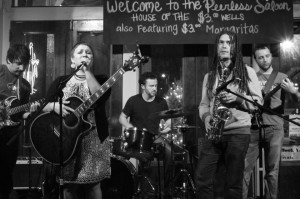The Glass Jars
Making music is a dynamic process. Just as songs may change key or tempo, musicians can make radical shifts from one note to the next. Jazz/Rock group The Glass Jars (formerly Loup-Garou) is always moving forward as their music develops. Since forming over a year ago, the band has seen members come and go, and their sound has evolved to make the most of each new change.
The Glass Jars’ current lineup includes singer/rhythm guitarist Shawna Ross, singer/guitarist Ian Newman, drummer Matt Herbert, bassist Jeremy Tidmore, alto sax player Albi Hille, and recent inductee Mollie McFarland on viola.
“We just sort of knew we were a band,” says Ross. “It was an accidental chemistry that was undeniable.” The group formed in February, 2012 at a baby shower for Albi’s wife. Each musician already knew that Albi was musically inclined and came prepared to play. When they arrived, they took the opportunity to throw together an impromptu jam session. “We brought our instruments, we jammed and said hey, this could be fun,” says Tidmore. “So the band was born.”
The lineup once featured a tenor sax player who has since relocated to Peru. For the following months, Albi assumed all sax duties, offering strong jazz and European influences to the band’s blues/rock mix. He skillfully delivers finger-snapping riffs like those in “Bluebird” and “Be Low.” He also leads the way with agile solos in tracks like “Desert.” Albi’s sax adds a unique dimension to Ross and Newman’s folk/rock informed lyrics, and TGJ’s warm sound would seem just as fitting in Birmingham as it would in any open door venue in New Orleans.
In May2013, Albi departed for Germany. The band missed him and his musical contribution, but quickly began examining their music to determine how they would evolve as a five-piece act.
On the string side, Tidmore brings classical experience to the table, which carries over well to the group’s jazzier compositions. The bass walks when it needs to and sulks along to slow tracks. It struts on funkier tunes like “Alienated,” which demands fast fingers for the barn-burner outro.
Newman’s guitar has a warm jazz tone that blends well during rhythm parts, but can stand out from the group when he takes off on a solo. His smooth instrumental break in “Cocoa Butter” would make any Chicago bluesman proud.
Herbert provides the foundation through solid percussion. Equally adapt to jazz, rock, and anything else the group may need, He can complement any song’s mood with appropriate tempo and style. Hebert can keep things fairly subtle during the verses, or crank up the energy for an exciting chorus. The Glass Jars’ set list features plenty of dynamic shifts, and Herbert must be prepared to change tempo on a dime. Hearing them pull off such sharp turns is extremely satisfying and denotes a very tight band.
This group proficiency can be clearly heard on “Glass Jars.” “It’s one of my favorites because it has lots of dynamics and changes, as well as meaningful lyrics,” says Herbert. “It starts really slow and ends very energetic.”
Mollie McFarland, the group’s newest member, joined with impressive credentials, including stints with Voices in the Trees, Tonight in a Jar, and September Red. Mollie brings impressive viola proficiency to the mix, and is eager to engage the city’s music scene in this new endeavor. “There are so many people playing and writing music just because that’s what they love to do,” she says. “It’s far from perfect, but I think that there are a lot of people dedicated to music for its own sake and that makes this a good place to be.”
Lead vocalist Shawna Ross has a strong midrange that fits perfectly with the band’s warm instrumentation. Whether it’s slow and sultry like their cover of “Why Don’t You Do Right” or the up and down “Bluebird,” Ross’ voice can grasp both the warmth of jazz and the intricacy of blues.
Ross also shares songwriting duties with Newman. “I sing about the details of my life, lessons learned about who I am and who I’d like to be,” she says. Themes focus on fear, desire, and a few physiological explorations. “I try to maintain a level of anonymity while remaining personally honest,” she says. “In most cases the songs are capable of exposing my most fragile vulnerabilities.”
The upbeat “Bluebird” came out of a period of reflection. “Bluebird is about my pursuit of happiness,” says Ross. “After examining all the sacrifices I felt I had made, I began to wonder where my reward was and if I deserved happiness.”
“Many of the songs I write are confessional,” says Ross. “They’re honest without being direct.” In the provocative “Cocoa Butter,” Ross says a lot without telling too much. “They write themselves and then when I go back and read the lyrics it all makes sense,” she says. “It’s my way to understand myself and my world.”
Newman enjoys the songwriting process, both lyrically and musically. He’s always enthusiastic about adding new songs to the set list. “It’s a really fun time where the song exists in a fairly solid state, but as a group, we are still editing and carefully adding or subtracting small details and sorting out what goes where and who plays what,” he says.
“Most of the lyrics I write aren’t really about anyone in particular,” says Newman. “They are just of images and ideas that come from everywhere.” The Spanish-infused “Navajo” centers on delusion and miscommunication. “In my head there are sort of arch-typical people, places, and things that I try to weave the images and ideas around.”

Leave a Reply